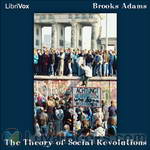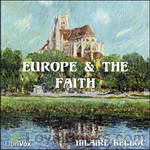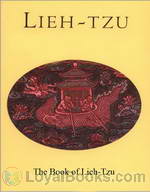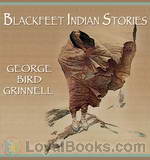|
Books Should Be Free Loyal Books Free Public Domain Audiobooks & eBook Downloads |
|
|
Books Should Be Free Loyal Books Free Public Domain Audiobooks & eBook Downloads |
|
History Books |
|---|
|
Book type:
Sort by:
View by:
|
By: Alfred Russel Wallace (1823-1913) | |
|---|---|
 The Malay Archipelago, the land of the orang-utan and the bird of paradise
The Malay Archipelago, the land of the orang-utan and the bird of paradise
| |
By: Brooks Adams (1848-1927) | |
|---|---|
 The Theory of Social Revolutions
The Theory of Social Revolutions
Brooks Adams (1848- 1927), was an American historian and a critic of capitalism. He believed that commercial civilizations rise and fall in predictable cycles. First, masses of people draw together in large population centers and engage in commercial activities. As their desire for wealth grows, they discard spiritual and creative values. Their greed leads to distrust and dishonesty, and eventually the society crumbles. In The Law of Civilisation and Decay (1895), Adams noted that as new population centers emerged in the west, centers of world trade shifted from Constantinople to Venice to Amsterdam to London... | |
 The Emancipation of Massachusetts
The Emancipation of Massachusetts
| |
By: Friedrich Nietzsche (1844-1900) | |
|---|---|
 Case of Wagner / Nietzsche Contra Wagner / Selected Aphorisms
Case of Wagner / Nietzsche Contra Wagner / Selected Aphorisms
A collection of three of Nietzsche's writings concerning the music of Wagner. In particular, he relates Wagner's music as degenerate, unrefined and unintelligent and relates it to a gradually degenerating German culture and society. The translator provides a detailed introduction. | |
By: Hilaire Belloc (1870-1953) | |
|---|---|
 The French Revolution
The French Revolution
“It is, for that matter, self-evident that if one community decides in one fashion, another, also sovereign, in the opposite fashion, both cannot be right. Reasoning men have also protested, and justly, against the conception that what a majority in numbers, or even (what is more compelling still) a unanimity of decision in a community may order, may not only be wrong but may be something which that community has no authority to order since, though it possesses a civil and temporal authority, it acts against that ultimate authority which is its own consciousness of right... | |
 Europe and the Faith
Europe and the Faith
The Catholic brings to history (when I say "history" in these pages I mean the history of Christendom) self-knowledge. As a man in the confessional accuses himself of what he knows to be true and what other people cannot judge, so a Catholic, talking of the united European civilization, when he blames it, blames it for motives and for acts which are his own. He himself could have done those things in person. He is not relatively right in his blame, he is absolutely right. As a man can testify to his own motive so can the Catholic testify to unjust, irrelevant, or ignorant conceptions of the European story; for he knows why and how it proceeded... | |
 The Path to Rome
The Path to Rome
| |
 A General Sketch of the European War The First Phase
A General Sketch of the European War The First Phase
| |
 Avril Being Essays on the Poetry of the French Renaissance
Avril Being Essays on the Poetry of the French Renaissance
| |
By: Lieh-Tzu | |
|---|---|
 The Book of Lieh-Tzü
The Book of Lieh-Tzü
The Liezi (Chinese: 列子; pinyin: Lièzĭ; Wade-Giles: Lieh Tzu; literally “[Book of] Master Lie”) is a Daoist text attributed to Lie Yukou, a circa 5th century BCE Hundred Schools of Thought philosopher, but Chinese and Western scholars believe it was compiled around the 4th century CE. During the reign of Emperor Xuanzong of Tang, the Liezi was designated a Daoist classic, completing the trilogy with the more famous Daodejing and Zhuangzi. The Liezi is generally considered to be the most practical of the major Daoist works, compared to the philosophical writings of Laozi and the poetic narrative of Zhuangzi... | |
By: Bret Harte (1836-1902) | |
|---|---|
 Thankful Blossom
Thankful Blossom
| |
By: William Harrison Ainsworth (1805-1882) | |
|---|---|
 Windsor Castle, Book 1
Windsor Castle, Book 1
Book 1 - Ann Boleyn. The focus of the novels is on the events surrounding Henry VIII's replacing Catherine of Aragon with Anne Boleyn as his wife. During Henry's pursuit of Boleyn, the novel describes other couples, including the Earl of Surrey and Lady Elizabeth Fitzgerald, a match Henry does not support. However, some of the individuals oppose Henry and his desires for Boleyn, including Thomas Wyat who wants her for himself and Cardinal Wolsey, who uses his own daughter, Mabel Lyndwood, to lure Henry away from Boleyn... | |
By: Samuel Butler (1835-1902) | |
|---|---|
 Evolution, Old & New Or, the Theories of Buffon, Dr. Erasmus Darwin and Lamarck, as compared with that of Charles Darwin
Evolution, Old & New Or, the Theories of Buffon, Dr. Erasmus Darwin and Lamarck, as compared with that of Charles Darwin
| |
By: US Army Corps of Engineers, Manhattan District | |
|---|---|
 The Atomic Bombings of Hiroshima & Nagasaki
The Atomic Bombings of Hiroshima & Nagasaki
This is the official report, published nearly 11 months after the first and only atomic bombings in history (to date), of a group of military physicians and engineers who accompanied the initial contingent of U.S. soldiers into the destroyed cities of Hiroshima and Nagasaki. The report presents a clinical description of the devastation, loss of life and continued suffering of the survivors that resulted from the world’s first and only atomic bombings. The appendix is an eyewitness account, contrasting... | |
By: Richard Jefferies (1848-1887) | |
|---|---|
 Field and Hedgerow Being the Last Essays of Richard Jefferies
Field and Hedgerow Being the Last Essays of Richard Jefferies
| |
 Nature Near London
Nature Near London
| |
By: George B. Grinnell | |
|---|---|
 Blackfeet Indian Stories
Blackfeet Indian Stories
The Blackfeet were hunters, travelling from place to place on foot. They used implements of stone, wood, or bone, wore clothing made of skins, and lived in tents covered by hides. Dogs, their only tame animals, were used as beasts of burden to carry small packs and drag light loads. The stories here told come down to us from very ancient times. Grandfathers have told them to their grandchildren, and these again to their grandchildren, and so from mouth to mouth, through many generations, they have reached our time. (Sibella Denton) | |